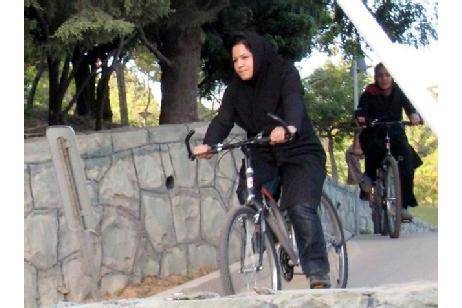
Women cyclists face jail, warns Iranian police chief
Michael Theodoulou
Hassan Karami added that women are also forbidden to roller-skate or play volleyball in public.
Iran's hardliners regard what women wear or how they behave outside their homes as a barometer of the regime's grip on power. The authorities fear that if they ease up on enforcing public "modesty", they will look weak.
Some lawyers say that "crimes" such as cycling cannot be prosecuted because there is no defined penalty for them under Iran's legal code.
But Iran's police do not need the case to go to court to intimidate women bicycle riders.

Iranian women ride their bicycles at Tehran's "Mothers' Paradise" park, which is the Iranian capital's women-only public recreation area.
"Those caught are usually punished for other things like flouting the dress code or being in the company of men they are not related to," said an analyst in Tehran, who declined to be named because of the sensitivity of the subject. "They might be arrested and held for a few days and then released after pledging in writing not to repeat the offence."
A hardline Tehran Friday prayers leader, Ayatollah Ahmad Khatami, told his congregation last month that he had received "worrying news" that women had been spotted cycling on the streets of the Iranian capital.
Such defiant women, however, are very rare. Most who cycle do so in parks that have special, sex-segregated lanes. Whether women should be allowed to ride bicycles at all has long been a controversial issue in Iran.
In 1996, a group of women cyclists, although correctly attired in ankle-length tunics over long trousers, were beaten up by moral vigilantes in Tehran's Chitgar Park which, three years earlier, had become the capital's first public space to offer separate cycling tracks for women.
It was in 1993 that Faezeh Hashemi, the daughter of Iran's then president, Ayatollah Akbar Hashemi Rafsanjani, masterminded the first Islamic Women's Games, which were held that year in Tehran and attended by some 500 athletes from 11 countries.
Today, Iranian women play most sports, from football and hockey to fencing and some martial arts. In all these activities they cover their heads and wear long shirts.
However, sports where the dress code cannot be observed, such as swimming and gymnastics, are not permitted in public, so Iranian women cannot participate in those events internationally. And some sports are out of bounds for women altogether, among them boxing, wrestling and weight-lifting.
Women's sports, frowned upon after the 1979 Islamic revolution, enjoyed a renaissance when Ms Hashemi's father was succeeded in 1997 as president by the reformist cleric Mohammad Khatami. As well as traditional sports such as archery and horse-riding, women started taking up activities such as water skiing and even golf.
The peak of Iranian women's sporting prowess came in May 2005, when Farkhondeh Sadegh, a graphic designer, and Laleh Keshavarz became the first Muslim women to climb Mount Everest.
A month later, Mahmoud Ahmadinejad was elected president and his hardline mentors and supporters began trying to roll back advances for women in sports.
As a populist, Mr Ahmadinejad personally did not seem bothered if the dress code was relaxed and he once suggested women should be allowed into soccer stadiums as spectators. But he swiftly retreated on both counts when clerics raised a storm.
There have been numerous instances since then of football-mad women disguising themselves as men to sneak into soccer stadiums.
In 2006, a celebrated Iranian film director, Jafar Panahi, made an award-winning movie called Offside, about women who succeed in cheering on their national team in a vital World Cup qualifier against Bahrain. Iran won the match.
Iranian women have a dynamic role in the country's public life. They outnumber men in universities and have the right to work, drive, vote and run for most public offices. But they do not have equal divorce, child custody or inheritance rights.
Mr Ahmadinejad's record on women's rights deteriorated sharply after his disputed re-election last year when women were on the frontline of huge street protests. The regime came to fear the well-organised and energetic activism of women, viewing their demands for equal rights as inseparable from the opposition's drive for greater democracy.
Women campaigning peacefully to end discriminatory laws against their sex have been harassed, detained and even jailed. Mr Ahmadinejad's government meanwhile is trying to push a controversial family law bill through parliament that would undermine women's rights further.
Women's sports and politics are never far apart in Iran. Ms Hashemi's office was broken into and vandalised in May, with suspicion falling on state-backed vigilantes. She is still deputy chair of Iran's Olympic Committee but receives little attention from the country's state-run media because the regime views her, like her father, as a political opponent.
In an interview with this correspondent in Tehran 12 years ago, Ms Hashemi, a keen cyclist, highlighted the political importance of women's sports. "If we push against tradition in sports," she said, "it will pave the way for reform in other areas."
That view is as relevant today as it was then, and explains why hardliners such as Isfahan's new police chief are determined to penalise women's pedal power.
www.thenational.ae/news/worldwide/middle-east/women-cyclists-face-jail-warns-iranian-police-chief
